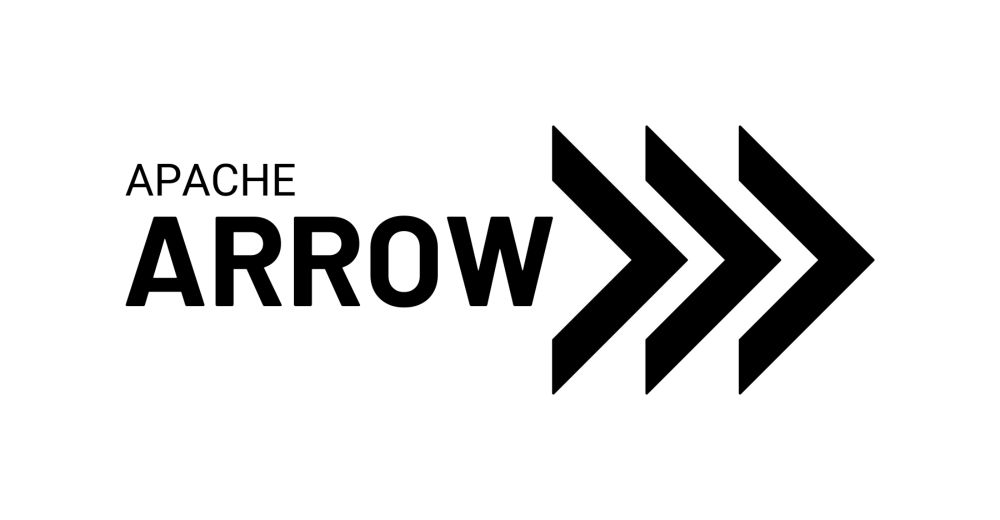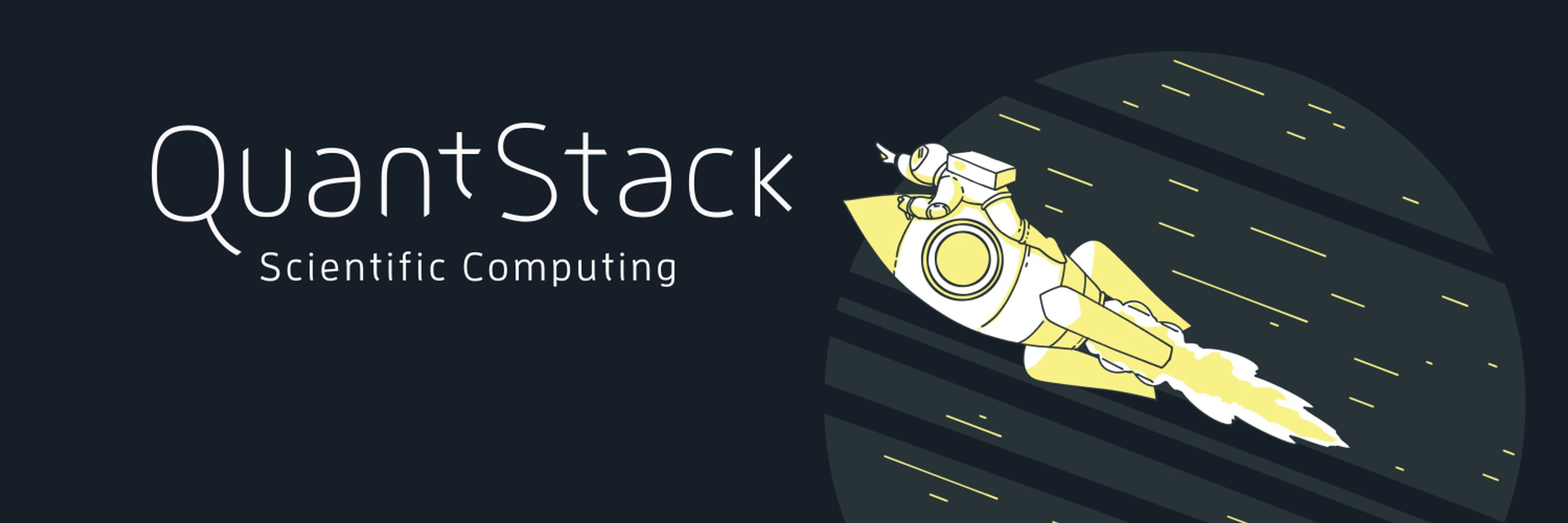
@jupyter.org maintainer
@PyDataParis.bsky.social organizer
ACM software system award 2017.
Highlights 🎁
- Enhanced notebook scrolling behavior
- Native audio and video support
- New Terminal search
- Debugger, Notebook and File Browser improvements
Check out the blog post to learn more!
blog.jupyter.org/jupyterlab-4...

Highlights 🎁
- Enhanced notebook scrolling behavior
- Native audio and video support
- New Terminal search
- Debugger, Notebook and File Browser improvements
Check out the blog post to learn more!
blog.jupyter.org/jupyterlab-4...
blog.jupyter.org/jupyter-comm...

blog.jupyter.org/jupyter-comm...
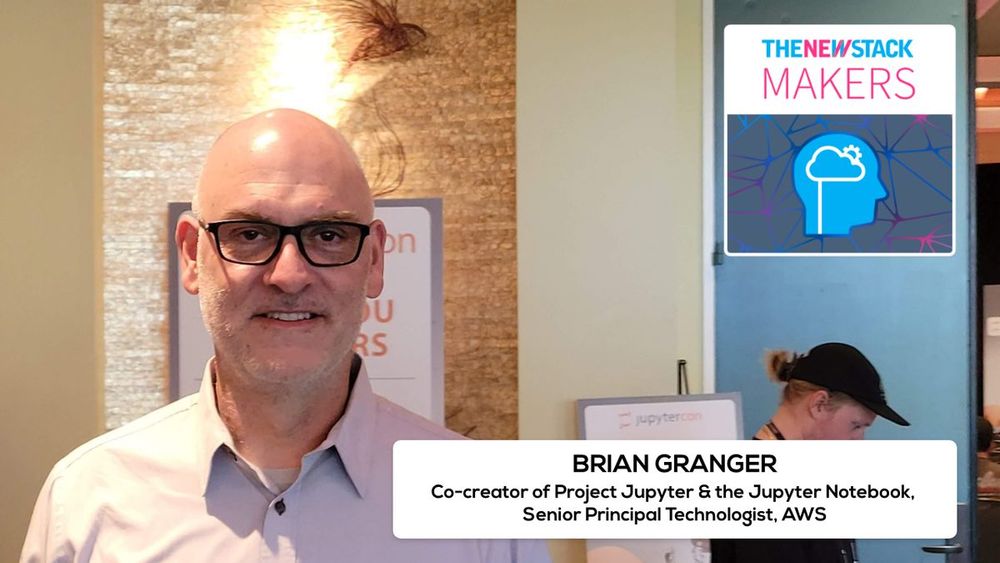




The event is hosted by
@pydataparis.bsky.social organizer of pydata.org/paris2025 (September 30th - October 1st)
We are looking forward to seeing you there and talking about all things Arrow.

The event is hosted by
@pydataparis.bsky.social organizer of pydata.org/paris2025 (September 30th - October 1st)
We are looking forward to seeing you there and talking about all things Arrow.
"Open-source Business", by @sylvaincorlay.bsky.social from @quantstack.bsky.social and @ylechelle.bsky.social from @probabl.ai
📜 Talk info: pretalx.com/pydata-paris-2025/talk/LMTCZS
📅 Schedule: pydata.org/paris2025/schedule
🎟 Tickets: pydata.org/paris2025/tickets

"Open-source Business", by @sylvaincorlay.bsky.social from @quantstack.bsky.social and @ylechelle.bsky.social from @probabl.ai
📜 Talk info: pretalx.com/pydata-paris-2025/talk/LMTCZS
📅 Schedule: pydata.org/paris2025/schedule
🎟 Tickets: pydata.org/paris2025/tickets
"Sparrow, Pirates of the Apache Arrow", by Johan Mabille and Alexis Placet.
📜 Talk info: pretalx.com/pydata-paris-2025/talk/YBFPCR
📅 Schedule: pydata.org/paris2025/schedule
🎟 Tickets: pydata.org/paris2025/tickets

"Sparrow, Pirates of the Apache Arrow", by Johan Mabille and Alexis Placet.
📜 Talk info: pretalx.com/pydata-paris-2025/talk/YBFPCR
📅 Schedule: pydata.org/paris2025/schedule
🎟 Tickets: pydata.org/paris2025/tickets
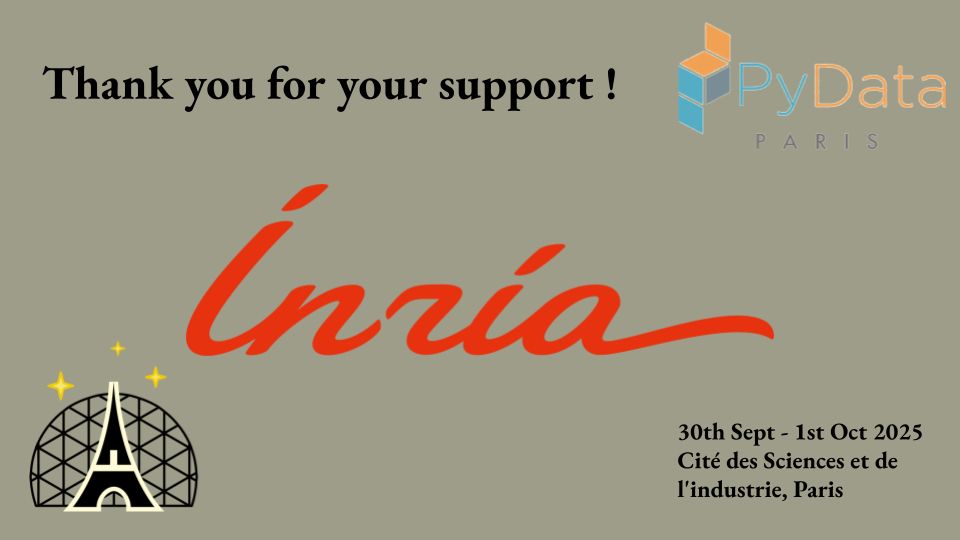
"Big ideas shaping scientific Python: the quest for performance and usability", by Ralf Gommers.
📜 Talk info: pretalx.com/pydata-paris-2025/talk/YBFPCR
📅 Schedule: pydata.org/paris2025/schedule
🎟 Tickets: pydata.org/paris2025/tickets

"Big ideas shaping scientific Python: the quest for performance and usability", by Ralf Gommers.
📜 Talk info: pretalx.com/pydata-paris-2025/talk/YBFPCR
📅 Schedule: pydata.org/paris2025/schedule
🎟 Tickets: pydata.org/paris2025/tickets
Get your tickets while you can, and see you in a month ⌛
@julialang.org @juliacon.bsky.social @pydataparis.bsky.social

Get your tickets while you can, and see you in a month ⌛
@julialang.org @juliacon.bsky.social @pydataparis.bsky.social
In the meantime, quick sneak peek 👀
In the meantime, quick sneak peek 👀
"Browser-based AI workflows in Jupyter", by @jtp.io and Nicolas Brichet from @quantstack.bsky.social.
📜 Talk info: pretalx.com/pydata-paris-2025/talk/7CNUUD
📅 Schedule: pydata.org/paris2025/schedule
🎟 Tickets: pydata.org/paris2025/tickets
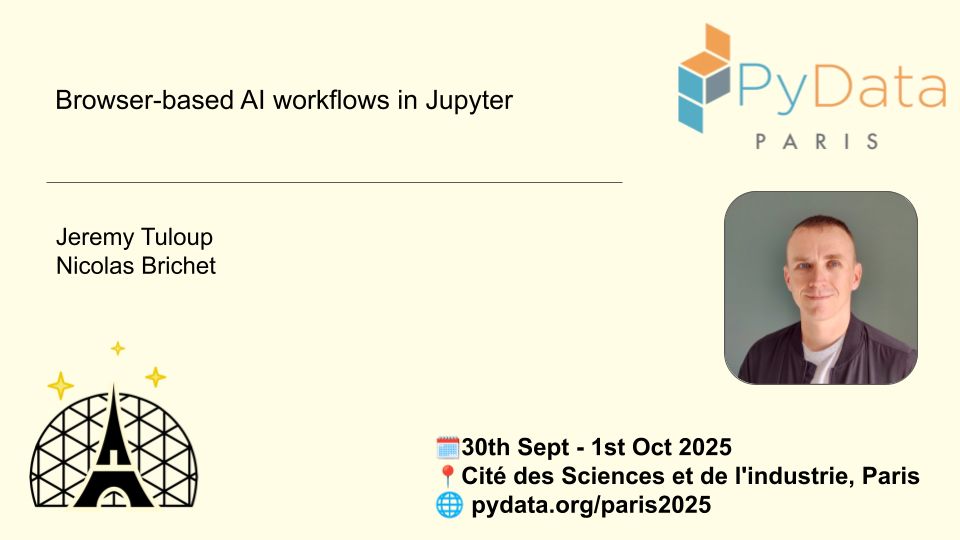
"Browser-based AI workflows in Jupyter", by @jtp.io and Nicolas Brichet from @quantstack.bsky.social.
📜 Talk info: pretalx.com/pydata-paris-2025/talk/7CNUUD
📅 Schedule: pydata.org/paris2025/schedule
🎟 Tickets: pydata.org/paris2025/tickets
"Meta-Dashboards: Accelerating Geospatial Web Apps Creation with Voilà", by Davide De Marchi.
📜 Talk info: pretalx.com/pydata-paris-2025/talk/F7EQ9X
📅 Schedule: pydata.org/paris2025/schedule
🎟 Tickets: pydata.org/paris2025/tickets
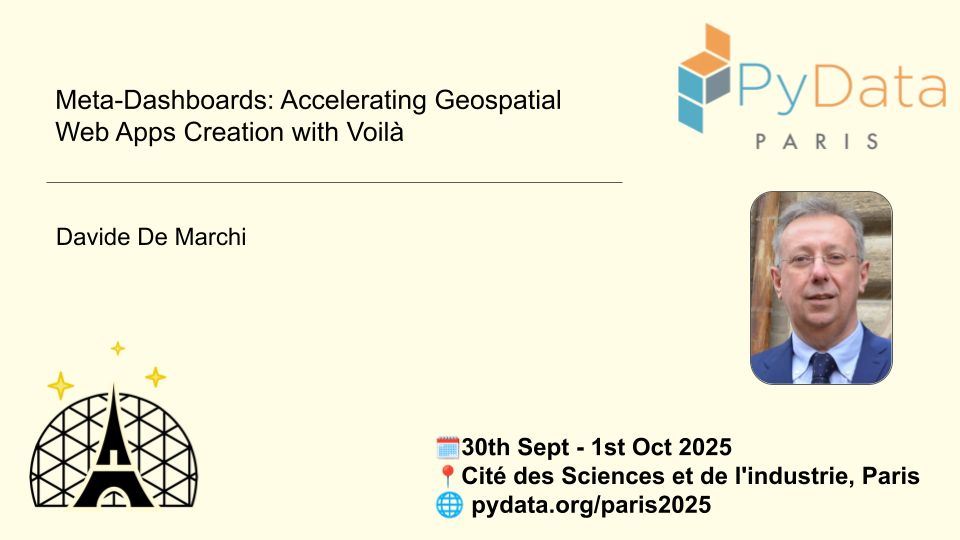
"Meta-Dashboards: Accelerating Geospatial Web Apps Creation with Voilà", by Davide De Marchi.
📜 Talk info: pretalx.com/pydata-paris-2025/talk/F7EQ9X
📅 Schedule: pydata.org/paris2025/schedule
🎟 Tickets: pydata.org/paris2025/tickets
pydata.org/paris2025/so...
pydata.org/paris2025/ti...

pydata.org/paris2025/so...
pydata.org/paris2025/ti...
The event is hosted by @pydataparis.bsky.social
We are looking forward to seeing you there and talking about all things Arrow.

The event is hosted by @pydataparis.bsky.social
We are looking forward to seeing you there and talking about all things Arrow.
"Probabilistic regression models: let's compare different modeling strategies and discuss how to evaluate them", by @ogrisel.bsky.social from @probabl.ai .
📜 pretalx.com/pydata-paris-2025/talk/DVMZBT
📅 pydata.org/paris2025/schedule
🎟 pydata.org/paris2025/tickets

"Applying Causal Inference in Industry 4.0: A Case Study from Glasswool Production", by Simona Bottani and Patrick Lee.
📜 Talk info: pretalx.com/pydata-paris-2025/talk/HL9VAB
📅 Schedule: pydata.org/paris2025/schedule
🎟 Tickets: pydata.org/paris2025/tickets

"Applying Causal Inference in Industry 4.0: A Case Study from Glasswool Production", by Simona Bottani and Patrick Lee.
📜 Talk info: pretalx.com/pydata-paris-2025/talk/HL9VAB
📅 Schedule: pydata.org/paris2025/schedule
🎟 Tickets: pydata.org/paris2025/tickets

"Building Data Science Tools for Sustainable Transformation", by Anita Graser.
📜 Talk info: pretalx.com/pydata-paris-2025/talk/BEJFAF
📅 Schedule: pydata.org/paris2025/schedule
🎟 Tickets: pydata.org/paris2025/tickets

"Building Data Science Tools for Sustainable Transformation", by Anita Graser.
📜 Talk info: pretalx.com/pydata-paris-2025/talk/BEJFAF
📅 Schedule: pydata.org/paris2025/schedule
🎟 Tickets: pydata.org/paris2025/tickets
We have an impressive lineup of keynotes, starting with Professor Laura Grigori (EPFL) and not stopping there!
juliacon.org/local/paris2...
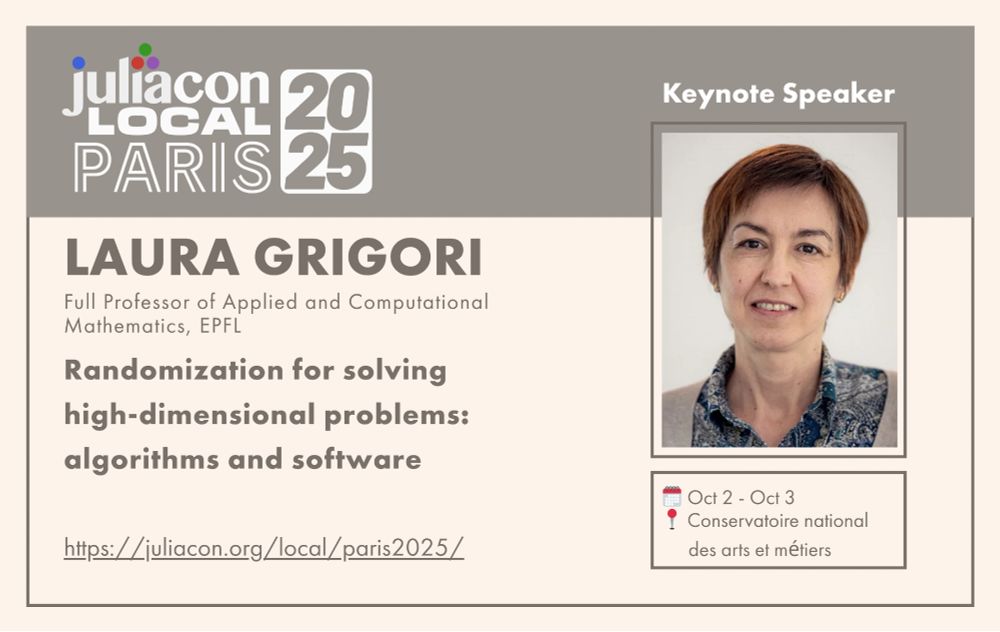
We have an impressive lineup of keynotes, starting with Professor Laura Grigori (EPFL) and not stopping there!
juliacon.org/local/paris2...
"xeus-cpp, the new C++ kernel for Jupyter", by Johan Mabille and Anutosh Bhat from Quantstack.
📜 Talk info: pretalx.com/pydata-paris-2025/talk/HRLACQ
📅 Schedule: pydata.org/paris2025/schedule
🎟 Tickets: pydata.org/paris2025/tickets"
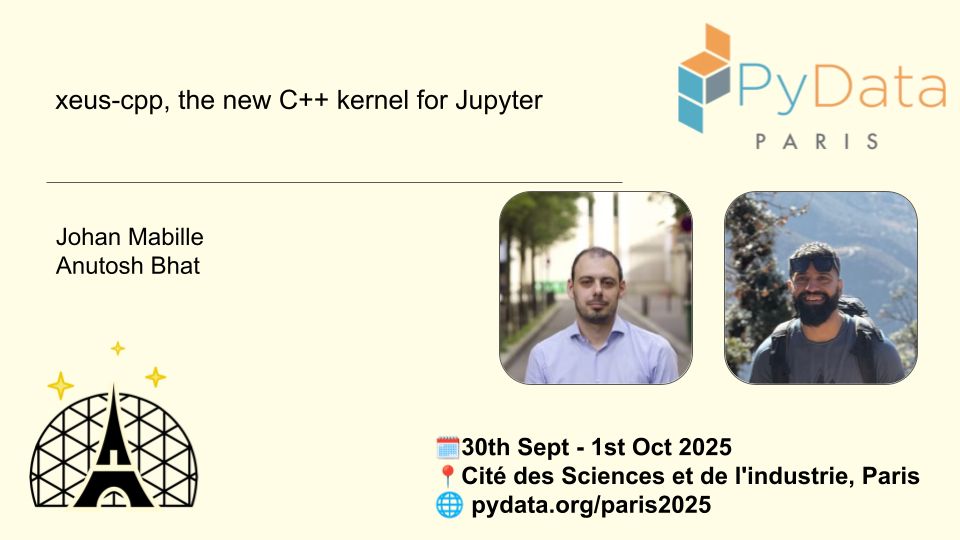
"xeus-cpp, the new C++ kernel for Jupyter", by Johan Mabille and Anutosh Bhat from Quantstack.
📜 Talk info: pretalx.com/pydata-paris-2025/talk/HRLACQ
📅 Schedule: pydata.org/paris2025/schedule
🎟 Tickets: pydata.org/paris2025/tickets"
"Move beyond academia: Introducing an industry-first tabular benchmark", by Alexandre Abraham.
📜 Talk info: pretalx.com/pydata-paris-2025/talk/7PUXWN
📅 Schedule: pydata.org/paris2025/schedule
🎟 Tickets: pydata.org/paris2025/tickets
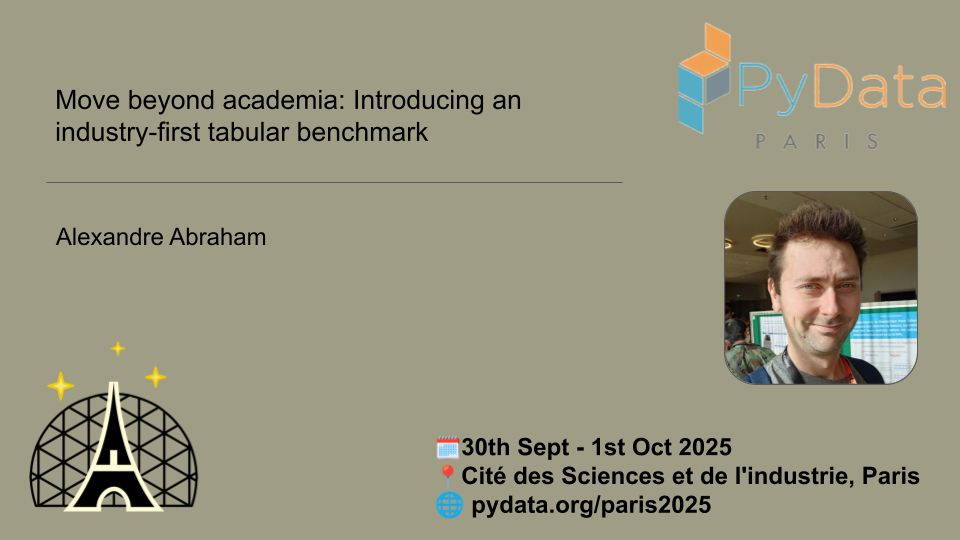
"Move beyond academia: Introducing an industry-first tabular benchmark", by Alexandre Abraham.
📜 Talk info: pretalx.com/pydata-paris-2025/talk/7PUXWN
📅 Schedule: pydata.org/paris2025/schedule
🎟 Tickets: pydata.org/paris2025/tickets
"Optimal Transport in Python: A Practical Introduction with POT", by Rémi Flamary.
📜 Talk info: pretalx.com/pydata-paris-2025/talk/FNCKXU
📅 Schedule: pydata.org/paris2025/schedule
🎟 Tickets: pydata.org/paris2025/tickets
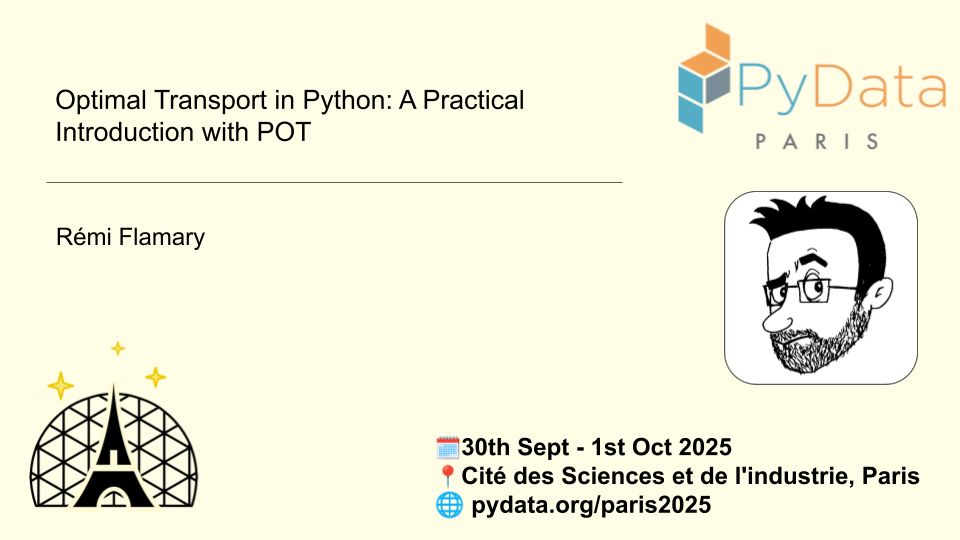
"Optimal Transport in Python: A Practical Introduction with POT", by Rémi Flamary.
📜 Talk info: pretalx.com/pydata-paris-2025/talk/FNCKXU
📅 Schedule: pydata.org/paris2025/schedule
🎟 Tickets: pydata.org/paris2025/tickets
arrow.apache.org/blog/2025/07...
